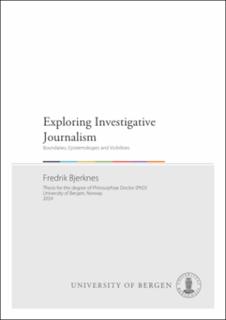| dc.contributor.author | Bjerknes, Fredrik | |
| dc.date.accessioned | 2024-04-09T06:04:54Z | |
| dc.date.available | 2024-04-09T06:04:54Z | |
| dc.date.issued | 2024-04-19 | |
| dc.date.submitted | 2024-03-21T13:37:46.951Z | |
| dc.identifier | container/59/5c/04/6b/595c046b-584c-4a58-84b2-64e1a094643b | |
| dc.identifier.isbn | 9788230864975 | |
| dc.identifier.isbn | 9788230847084 | |
| dc.identifier.uri | https://hdl.handle.net/11250/3125376 | |
| dc.description.abstract | Denne avhandlingen utforsker ulike former for visuelle utrykk og institusjonaliserte epistemiske praksiser i undersøkende journalistikk gjennom å studere hvordan undersøkende journalister sannsynliggjør sine påstander og argumenterer for sin epistemiske autoritet. Avhandlingen inntar en sosiologisk tilnærming til studiet av journalistisk kunnskapsproduksjon og forsøker å besvare det overordnede todelte forskningsspørsmålet: Hva skiller undersøkende journalistikk fra andre typer journalistikk, og hvordan brukes det visuelle som bevis for å fremsette påstander i undersøkende journalistikk? Avhandlingen består av en innledning og tre forskningsartikler. Artiklene tar i bruk tre ulike typer kvalitativ tekstanalyse i tre forskjellige empiriske kontekster. Artiklene analyserer (1) hvordan undersøkende journalister konkurrerer om å utvikle innovative metoder, (2) hvordan innsamlede brukergenererte fotografier og videoer mobiliseres som bevis i digital undersøkende journalistikk, og (3) hvordan profesjonelle fotografier brukes til å signalisere autoritet og tilsløre usikkerhet i undersøkende kriminaljournalistikk. Med utgangspunkt i et teoretisk rammeverk som kombinerer perspektiver fra kunnskapssosiologi, vitenskapsstudier og visuell kulturstudier, foreslår avhandlingen at undersøkende journalistikk kan forstås som en særegen og tilpasningsdyktig form for journalistisk kunnskapsproduksjon. Ved å opptre som en vaktbikkje på vegne av samfunnet som avslører og påpeker moralske og lovmessige overskridelser, fungerer undersøkende journalistikk som den ultimate journalistiske autoritetsmarkøren og en legitimering av journalistikk som et viktig kunnskapsproduserende felt. Et empirisk hovedfunn i artiklene er at visualiteten og epistemologien til undersøkende journalistikk reforhandles og endres kontinuerlig gjennom ulike former for materiell produksjon og i den metajournalistiske diskursen som omslutter denne produksjonen. Avhandlingen konkluderer derfor med en provoserende påstand om at det ikke finnes noe slikt som ren undersøkende journalistikk. Det er mer presist og produktivt å snakke om grader av undersøkende attributter i nyhetstekster, epistemiske praksiser og visuelle uttrykk. Oppsummert bidrar avhandlingen til den internasjonale forskningslitteraturen på undersøkende journalistikk, journalistiske epistemologier og visuell journalistikk. | en_US |
| dc.description.abstract | This thesis explores the visuality and epistemology of investigative journalism by analysing how investigative reporters justify their knowledge claims and make a case for their epistemic authority. Adopting a sociological approach to the study of epistemology, the thesis attempts to tackle the overarching twofold research question: How is investigative journalism distinguishable from other forms of journalism, and how is visual evidence used to make knowledge claims in investigative journalism? The thesis consists of a framing introduction and three empirical articles. The articles deploy three approaches to qualitative textual analysis to study investigative journalism's discursive boundaries and epistemic practices. The articles analyse (1) how journalists compete to develop innovative methods, (2) how collected user- generated photographs and videos are mobilised as evidence in digital investigative journalism, and (3) how professional photographs are used to signal authority and veil uncertainty in investigative crime journalism. Drawing on theoretical insights from the sociology of knowledge, science and technology studies, and visual culture studies, the thesis suggests that investigative journalism can be understood as a distinctive yet malleable form of journalistic knowledge production with porous boundaries, expanding epistemologies, and multiple visibilities. By uncovering moral and legal transgressions and holding the powerful to account on behalf of the general public, investigative journalism functions as the ultimate marker of journalistic authority that legitimises and upholds journalism as an important and reliable knowledge-producing field in society. Empirically, the thesis demonstrates that the visuality and epistemology of investigative journalism are constantly being reconfigured and renegotiated in its material output and in the metajournalistic discourse surrounding this output. The thesis thus concludes on a provoking note, arguing that there is no such thing as pure investigative journalism. Rather, it is more accurate and productive to talk about degrees of investigative attributes in news texts, epistemic practices, and visualities. The thesis contributes to the international research literature on investigative journalism, the epistemologies of journalism, and visual journalism. | en_US |
| dc.language.iso | eng | en_US |
| dc.publisher | The University of Bergen | en_US |
| dc.relation.haspart | Paper I: Bjerknes, Fredrik (2022) Inventive Factfinders: Investigative Journalism as Professional Self-representation, Marker of Identity and Boundary Work, Journalism Practice, 16:6, 1037-1056. The accepted manuscript is available at: <a href="https://hdl.handle.net/11250/2731775" target="blank">https://hdl.handle.net/11250/2731775</a>. | en_US |
| dc.relation.haspart | Paper II: Bjerknes, Fredrik (2022) Images of Transgressions: Visuals as Reconstructed Evidence in Digital Investigative Journalism, Journalism Studies, 23:8, 951-973. The article is available at: <a href="https://hdl.handle.net/11250/3060874" target="blank">https://hdl.handle.net/11250/3060874</a>. | en_US |
| dc.relation.haspart | Paper III: Bjerknes, Fredrik (2023) Visualising a Murder Mystery: Shifting Visibilities and Epistemic Uncertainty in Investigative Crime Journalism. Not available in BORA. | en_US |
| dc.rights | In copyright | |
| dc.rights.uri | http://rightsstatements.org/page/InC/1.0/ | |
| dc.title | Exploring Investigative Journalism. Boundaries, Epistemologies and Visibilities | en_US |
| dc.type | Doctoral thesis | en_US |
| dc.date.updated | 2024-03-21T13:37:46.951Z | |
| dc.rights.holder | Copyright the Author. All rights reserved | en_US |
| dc.contributor.orcid | 0000-0003-0343-5651 | |
| dc.description.degree | Doktorgradsavhandling | |
| fs.unitcode | 15-17-0 | |
